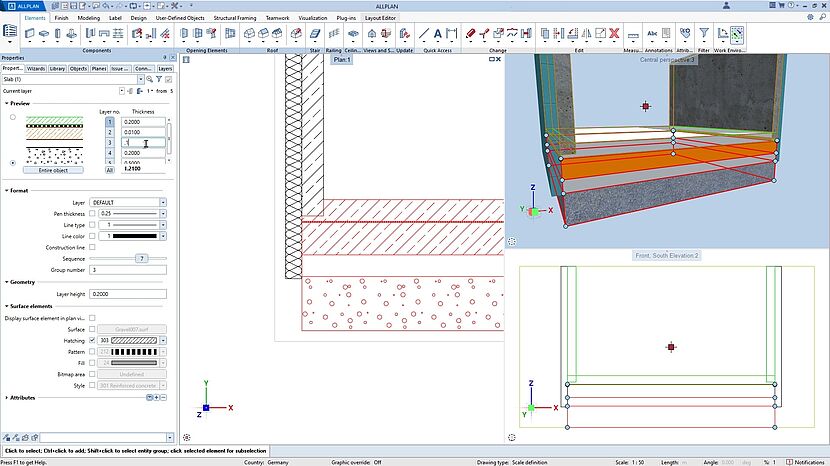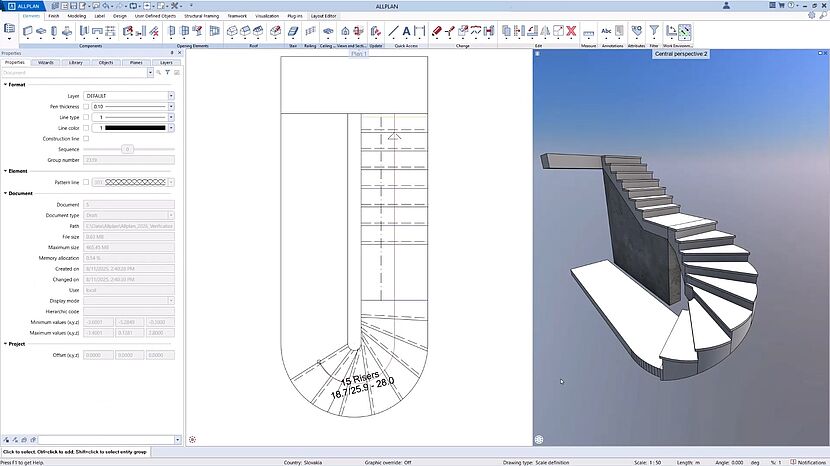New releases said to drive productivity, accuracy, and collaboration from design to build
Allplan’s new 2026 product lineup — developed for architects, engineers, detailers, fabricators, and construction professionals — puts a strong emphasis on automation, collaboration, and sustainability.
To expand its sustainable design capabilities, the new release features an integration with Preoptima Concept, a third party tool for whole-life carbon assessments (WLCAs)
This workflow enables architects and engineers to export conceptual mass models directly from Allplan for early-stage carbon assessment, well before a detailed BIM model is required. In addition to embodied carbon, users can assess operational and whole-life carbon, compare multiple design variants, and make more informed design decisions
With the introduction of GeoPackage DataExchange, urban planners and designers can now integrate GIS data across all EU countries and beyond. According to Allplan, providing access to accurate site context supports better decisions on zoning, infrastructure, and environmental impact.
A new AI Assistant, available through the Connect platform, aims to improve planning efficiency and decision making by providing guidance on Allplan workflows, AEC standards, and best practices, while offering smart suggestions for tasks ranging from construction standards to coding support.
There is also a new free tool, the Allplan Model Viewer, which makes browser-based IFC visualization available to all project stakeholders.

XRef Manager delivers a unified overview and simplifies data management. Cloud Reference, a new IFC XRef type, allows direct insertion of IFC files into Allplan via BIMPLUS, enhancing information sharing within a common data environment.
Allplan 2026 also offers support for IDS-based attribute import, helping ensure BIM models include all the necessary data for compliance, together with enhanced IFC4 import capabilities for smoother data exchange. New interfaces in BIMPLUS for collaboration include IFC 4.3 import and extended export capabilities for GLB format for better visualisation.
Elsewhere, an extension to the Allplan Bluebeam connection enables users to more easily bring documents from the Bluebeam Studio Project environment into their Allplan workflows.
For architects, new tools make it easier to design freeform staircases, while new multilayer support for slabs simplifies the modelling of complex assemblies such as foundations and terrain layers.
BIM-compliant room and finish detailing have been improved with multilayered finishes, rule-based distribution, advanced filtering, and flexible layer management. With custom component priority-based connections, designers can now model complex shapes more accurately while automated interactions reduce manual effort and minimise errors. According to Allplan, these features simplify the creation of precise 2D and 3D representations, reduce errors, and accelerate updates — delivering consistent, detailed results from early design through to sustainable, ready-to-build execution
For infrastructure design, Allplan 2026 introduces a new parametric tunnel modelling approach which integrates alignment, cross-section definitions, and construction methodology, to provide engineers and detailers with ‘precise and efficient’ modelling capabilities, while ‘significantly improving performance’.
There’s also advanced 3D layer management for complex civil projects, and a newly unified Digital Terrain Modeler that is said to enable accurate and detailed terrain workflows. Elsewhere, parametric road intersection modelling has been expanded to enable more realistic intersection models, with reduced manual rework.
For structural analysis and design, it’s now easier to import Structural Analysis Format (SAF) files thanks to a direct import into BIMPLUS, which ‘instantly generate’ a 3D analytical model for visualisation and interrogation. Users can also now ‘seamlessly transfer’ their 3D models to the BIM-Connector making it easier to work across Allplan solutions.
A new mobile loads functionality enables engineers to ‘quickly and automatically’ identify and analyse scenarios, whilst new footfall analysis supports evaluation of how structures respond to human-induced vibrations. Finally, newly amalgamated modules for component-based analysis and design include an expanded unified foundations module.
Structural reinforcement detailing has also be improved with enhanced automation of column reinforcement design. According to the developers, this makes it easier, faster, and more reliable to transfer reinforcement layouts from analysis and design.
Automated wall reinforcement workflows are also enhanced through single-click horizontal or vertical reinforcement priorities and toggling reinforcement types on or off.
Precision for complex circular and spiral structures has been enhanced through updated circular reinforcement capabilities and a new reinforcement to field workflow. Detailers and rebar fabricators can now place reinforcement directly in isometric views, benefit from improved attribute management, and effectively handle reinforcement collisions in a fully digital drawing-less process.
For prefabrication and construction, by uniting design and fabrication in a common workflow, Allplan 2026 enables precast fabricators to benefit from what is describes as consistent outputs with reduced manual work and errors. Rule-based dimensioning automates the generation of production-ready drawings, ensuring every precast element receives the exact dimensions required according to customizable rules and standards. New automated dimensioning for local views enables accurate representation, precision, and consistency despite modifications, whilst customizable quantity takeoff enables users to export Bills of Materials with the data needed for ERP systems or clients.
For steel detailers and fabricators, Allplan’s dedicated structural steel solution for 2026 includes new functionality for creating custom profiles, enabling users to handle specialty detailing and added intelligence for custom connections through constructability checks. Design and detailing possibilities are expanded with support for new material types.
Finally, some significant groundworks improvements in Allplan 2026 are designed to simplify complex construction model management, reduce errors, speed up project delivery, and ensure reliable data handover to construction teams.






